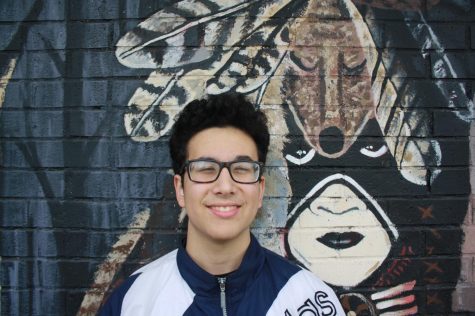Sexual Harassment allegations “muddy the waters” around Sherman Alexie
9th Grade ELA teacher Roxanne Becker spoke about the Alexie allegations. “His work deals with understanding your identity and choices you make about how you are. I can’t fathom another book that would do that job. But, I also can’t fathom teaching it knowing what he has done,” said Becker
April 9, 2018
Disclaimer; this article contains mentions of sexual assault and r*pe.
Sherman Alexie has provided an important resource in Language Arts classrooms all over South for years but new allegations have changed how his literature and art is thought about in the English department. “As a group we are having conversations about how and whether we will teach his work moving forward… You have to figure out what it means to you. Sometimes you appreciate the art for what it is without the artist,” said Open teacher Michelle Ockman.
Sherman Alexie has been accused of sexual harassment by many female writers, especially Native writers. They say that Alexie has tried to force himself upon them, touched them inappropriately, and made them exchange forced affection for his support of their work in the form of reviews and endorsements. Alexie is viewed by many as the preeminent Native writer right now and this power had allowed his actions to go unchallenged in the publishing world and unknown within his readership. “That these allegations came out does not mean his writing is less brilliant. It kind of muddy’s the waters over whether his work can stand on its own,” said Fabel.
Alexie’s books are used by the 9th Grade Liberal Arts teachers, 10th grade Open teachers, and the All Nations program. His works that have been used include Reservation Blues, The Absolutely True Diary of a Part Time Indian, and The Lone Ranger and Tonto Fistfight In Heaven. 10th grade teacher Ted Fabel said, “we taught Reservation Blues with a focus on generational and historical trauma and I taught Absolutely True Diary of a Part Time Indian as a coming of age novel.”
Many of these books deal with themes around cultural trauma, growing up, colonialism, and both sexual and childhood abuse. “In quarter two, [we use] the Diary to show what happens when a group comes in a colonized another minority. We look at what happened to those minorities? Who is writing that history. We also use it to show the hero’s journey,” said 9th grade ELA teacher Roxanne Becker. Teachers have found his work as an important and instructive way of showing Native life and history.
These new allegations have elicited many deep and strong reactions within South’s english department. Alexie’s writing is informed by his trauma as a Native person and as the victim of rape at the age of 10. This trauma is understood by him as extremely damaging. The knowledge that he has inflicted similar traumas on other writers is very troubling for many english teachers. This is also magnified with Native women, as Native women have faced gencodial sexual violence inside their communities and by the United States government for years as an ongoing part of colonialism. 1 in 2 Native women have experience sexual violence, according to the Indian Law Resource Center.
This violence that Alexie inflicted is seen by many as partly influenced by his own childhood. “I can totally see where this behavior came from. You know this is part of this trauma, his mom was raped. He, looks nothing like his siblings so he grew up with that feeling; ‘Am I the product of rape?’ You can’t accept the art knowing full well this is what he was doing,” said Becker.
There has already been a lot of backlash around this new knowledge. For example, Alexie declined to take the American Library Association’s Carnegie Award for Nonfiction. Many scholarships named after him have changed their names. Even more stunningly, his memoir’s paperback publishing has been stopped indefinitely. These reactions have severely tarnished his image inside the publishing world.
South’s teachers will either not teach the books next year or have critical discussions about his work. “His work deals with understanding your identity and choices you make about how you are. I can’t fathom another book that would do that job. But, I also can’t fathom teaching it knowing what he has done,” said Becker. While many hope to be able to teach a different author, cost issues may hamper that. They would need 300 new books and with a tight budget it is unknown if that is a possibility. “I don’t know what funds I have to buy another book in my department. I just don’t know where I can get the money,” said Becker.
Other teachers have made the outright decision not to teach his work. “I think I’m going to take a year break on teaching his work at least until …. I see where this situation goes and what Alexie’s responses are. I want to come to my own terms on how I feel about the author, with on the record sexual assault allegations… Does still promoting his work allow the actions to be dismissed?” said Fabel.







Eileen M Riley Hall • May 9, 2018 at 7:34 am
I am finding this entire metoo movement has veered off course. I am childhood sexual abuse survivor. I know the agony and self-loathing that comes from someone in power forcing himself on you. But I just think many of these cases of “sexual assault” are men who think they are more appealing than they are. If someone tries (albeit too aggressively) to kiss, that is unappealing. But if you say no, and he stops, then that is not sexual assault. Sexual assault is violence, rape, and complete annihilation of your person by someone bigger, stronger. You don’t get to say no and walk away. Are these authors lecherous yes, just as Mick Jagger and every rock star is sexist and lecherous. But that is not rape. And I am sure there are women and gay men who do the same thing. I am not condoning bad behavior, but trying to sleep with lots of women, sleazy yes, especially if you are married. But it is not rape, not sexual assault. True sexual assault survivors are hurt when every woman who is hit on by a man she found unattractive cry rape.
Paul • Apr 13, 2018 at 2:41 am
This is very common in the Native art scene. There are gatekeepers that associate themselves with access to organizations that artists need for success. Then the texting, emailing, and meeting up starts. Then things progressively get awkward and sexually inappropriate. It is a shame because Alexie has shown incredible talent at times. He captured voices that all Natives knew but had never been able to hold and read. I always thought he had another good book in him. He has inspired a lot of Native writers and while he did not break any laws he made rules for everyone else and abused his position which I think is why he is done for the time being. If he wanted to be the playboy he should have stayed single and embraced the lifestyle.
Burro • Apr 11, 2018 at 10:13 am
This is the problem with this phase of the #MeToo movement. It conflates, without any kind of distinction and oftentimes (as in this article) without even minimal detail about actual behavior, everything from rape to workplace sexual harassment to guys who cheat on their girlfriends. Alexie’s behavior seems to fall into the middle tier as no one has accused him of rape, despite the spurious insinuations of this article’s disclaimer. In fact, all his accusers, such as they are, state that their sexual relations were consensual.
Sexual harassment of the kind that Alexie is accused of should not be condoned. I have an equally low opinion, however, of teachers who make their curricular choices based on issues lying outside the literature that they have been hired to teach. The study of literature will devolve into tabloid journalism in no time quick. While it is obvious to me that Alexie has been a bad actor and is in need of stiff reprimand, it is also rather obvious that the motives of his principle accuser, the one who is leading the Twitter rally against him, are less than noble.
Mike • Apr 9, 2018 at 5:16 pm
I read the NPR piece about Alexie in which three of his accusers were interviewed. I can’t say that this article reflects those allegations. Furthermore, nothing he does appears to be criminal. Inappropriate, sure, but worth losing his career over? I don’t think so.